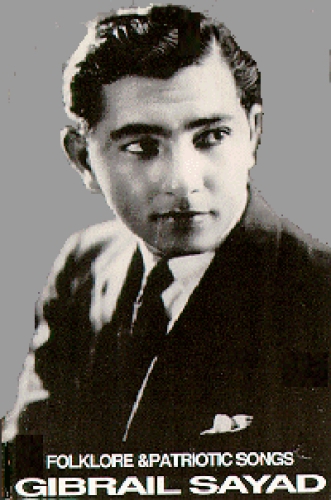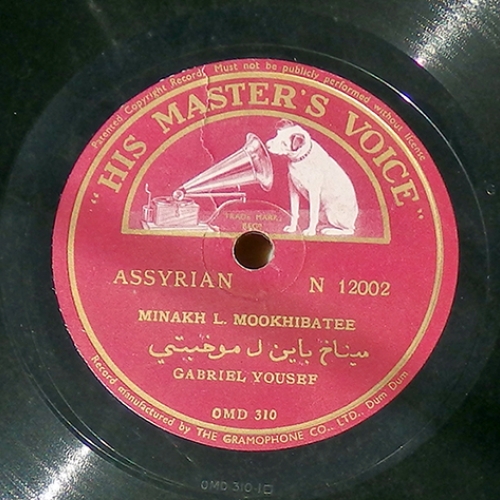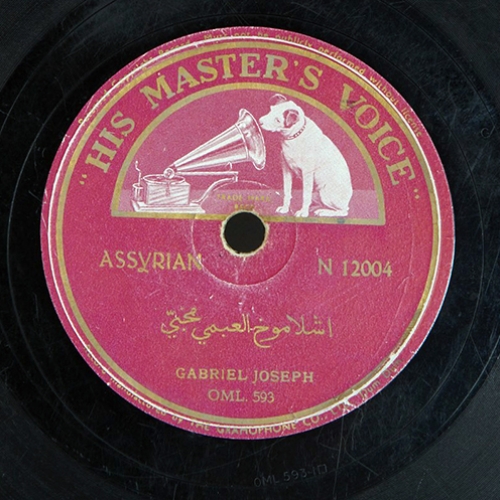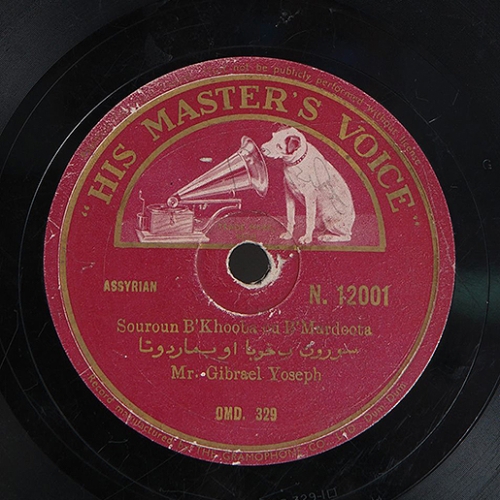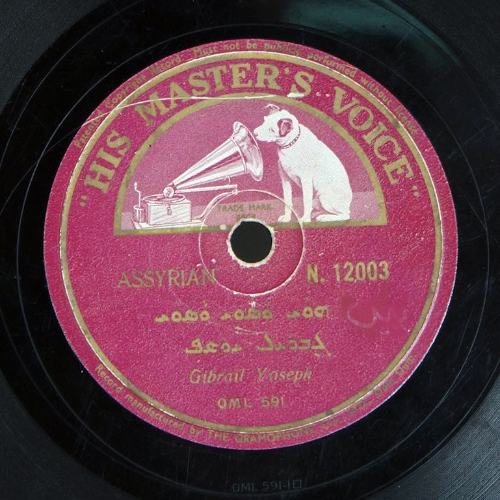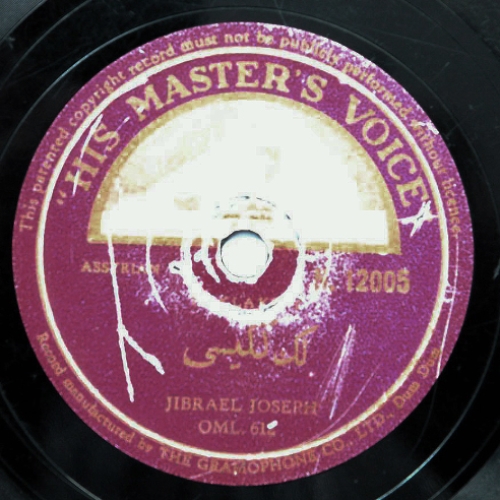Gibrail Yosip Sayad
Details
- Artist Type
- Singer
- Biography
-
Gabriel Yosip Sayad: 1914 - 1995
(By Ramsina Sayad For Nineveh Magazine, Vol.19 - 1996)Gibrail was born September 10, 1914, in Urmia, Iran, to Yosip and Sonya Sayad. He was a member of the Assyrian Foundation of America, Bet-Nahrain Organization, Assyrian American Civic Club of Turlock and the Assyrian Church of the East in Modesto.
Corroborating Philimon Darmo's commentary in February 1986 on Assyrian Radio Broadcasting from Sydney, Australia, concerning Gibrail's songs, Marduk Sayad says "many voices have cried out against the senseless disregard of human rights. In the Assyrian community in Iraq one voice was heard above all others during the 1930s. Gibrail was only a tanager when he was overwhelmed by the news of the 1933 Simmele Massacre of Assyrians at the hands of Iraqi military factions. Gibrail's patriotism did not drive him to take arms against the persecutors of his people, yet his choice of weapon was more powerful. The words and songs he chose united and compelled the Assyrian community in Iraq to survive the Iraqi regime's merciless persecution of his people. He dared to raise his rich tenor voice on stage and, finally, in recordings of ten songs, including four very patriotic songs written by famous composers: Dr. Freydoun Atouraya and Raabi Yacoub Bet Yacoub."
Gibrail was only a teenager when he was overwhelmed by the news of the 1933 Simmele Massacre of Assyrians at the hands of Iraqi military factions. Gibrail's patriotism did not drive him to take arms against the persecutors of his people, yet his choice of weapon was more powerful. The words and songs he chose united and compelled the Assyrian Community in Iraq to survive the Iraqi regime's merciless persecution of Gibrail's people. He dared to raise his rich tenor voice on stage and, finally, in recordings of ten songs, Including four very patriotic songs written by famous composers: Dr. Freydoun Atouraya and Raabi Yacoub Bet Yacoub."
In 1943, Raabi William Daniel recruited Gibrail as the leading tenor and dramatist in the Assyrian Broadcasting Group in Iran. In tandem with his career as a vocalist, Gibrail pursued social commentary theater in keeping with his political activism. He played in 'Hamlet,' 'Merchant of Venice,' 'Arshin Mal-alan' and 'Darwoosh' under the direction of Raabi Yacoub Bet-Yacoub and in 'Doctor Without His Will' (Moliere) and 'Prohibition of Alcohol' under the direction of Raabi William Daniel.
In 1952 his political activities gained him an elected post in the first Assyrian National Committee in Tehran, Iran. The F.A.N.C. was founded by Rabbi Adi Alkhas and his colleagues as a patriotic roanization to farther the goals of the Assyrian community and preservation of Assyria's ancient culture.
In his letter to Gibrail, Mikhael (Minashi) K. Pius, says "I want you to know that I enjoyed the TV program about you and your songs, and my opinion is that you could, with justification, consider your songs . . . and especially Ya Nishra Tkhumeh - the first few Assyrian classics! Your songs can still hold their own against those of the top Assyrian singers of today! I feel your songs were born mostly out of a labor of love - rather than out of love of fame and gain." Furthermore, Philimon G. Darmo, in a letter to Gibrail says, "How much I value your contribution to Assyrian song and music. The few songs you recorded so many years ago have become immortal and shall continue to delight Assyrian listeners for many generations to come. The beauty of their lyrics and your sweet and highly professional voice and style shall retain their grandeur till the end of time.
Furthermore, Philimon G. Darmo of the Assyrian Radio Program, Sydney, Australia, in a letter to Gibrail says, "This is a personal note from me to you simply to say how much I value your contribution to Assyrian song and music. The few songs you recorded so many years ago have become immortal and shall continue to delight Assyrian listeners for many generations to come. The beauty of their lyrics and your sweet and highly professional voice and style shall retain their grandeur till the end of time."
Gibrail is a product of Union School (Hinaidi) and American High School (Baghdad). He worked with the RAF and Air Ministry Audit Office. He was the first Assyrian who joined the Civil Air Industry with the Imperial Airways/BOAC and helped other Assyrians join him. In Iran he continued this course and as a result many Assyrians followed suit. He created Iran Trans Company, Iran Express and Skyways Travel Ltd. It was through the latter firm that he helped Gilgamish Magazine financially.
Gibrail came to the United States in 1965 to rejoin his family in California. They first lived in Daly City, moved to Fremont in 1980 and to Modesto in 1989. Prior to his retirement in 1986, Gibrail worked with Morrison Knudson Construction, Bechtel Corporation and Mayflower Movers. Gibrail, a devoted husband and father, is survived by his lovely wife, Katoon (Kathy); four children: Nineveh Wedlake (Redwood City, Calif. Ramina Nunnel, Los Angeles, Calif.), Ramsina Sayad and Ramon Sayad (both of Modesto); four grandchildren; and a great grand daughter.
Prior to his retirement in 1986, Gibrail worked with Morrison Knudson Construction, Bechtel Corporation and Mayflower Movers. The Sayads have four children: Nineveh Wedlake, Ramina Nunnelly, Ramsina Sayad and Raman Sayad; and four grandchildren: Chantal Eremian, Natalie Eremian, Paul Wedlake and janna Wedlake. Gibrail and Khatoon reside now in Modesto. They participate in the large Assyrian Community in Stanislaus County. Gibrail is still sought by young Assyrians to recount the tales of a majestic civilization.
Gibrail Yosip Sayad passed away on December 29, 1995 at the Doctors Medical Center in Modesto, Califomia at the age of 81. He was interned on January 3, 1996 at Turlock Memorial Park. The funeral service, in which several priests and deacons of the Assyrian churches participated, was officiated by Rev. Oushana Kanoon at Mar Zia Assyrian Church of the East, Modesto. The service was attended by a large gathering of Assyrians from all over Califomia. A memorial lunch was given at the Mar Zia church hall where the late Gibrail Sayad was eulogized by Sargon Dadesho, Ramon Sayad and Paul Wedlake.
Another Assyrian Winged Lion has fallen and we pay tribute to the warrior he was in his life." Gibrail's pleasant memories will be cherished by the famfly who respected and loved him dearly, as well as all who knew him. The family extend their appreciation to all who offered their condolences and kind thoughts on his loss.
(By Ramsina Sayad For Nineveh Magazine, Vol.19 - 1996)
Gibrail was born September 10, 1914, in Urmia, Iran, to Yosip and Sonya Sayad. He was a member of the Assyrian Foundation of America, Bet-Nahrain Organization, Assyrian American Civic Club of Turlock and the Assyrian Church of the East in Modesto.
Corroborating Philimon Darmo's commentary in February 1986 on Assyrian Radio Broadcasting from Sydney, Australia, concerning Gibrail's songs, Marduk Sayad says "many voices have cried out against the senseless disregard of human rights. In the Assyrian community in Iraq one voice was heard above all others during the 1930s. Gibrail was only a tanager when he was overwhelmed by the news of the 1933 Simmele Massacre of Assyrians at the hands of Iraqi military factions. Gibrail's patriotism did not drive him to take arms against the persecutors of his people, yet his choice of weapon was more powerful. The words and songs he chose united and compelled the Assyrian community in Iraq to survive the Iraqi regime's merciless persecution of his people. He dared to raise his rich tenor voice on stage and, finally, in recordings of ten songs, including four very patriotic songs written by famous composers: Dr. Freydoun Atouraya and Raabi Yacoub Bet Yacoub."
Gibrail was only a teenager when he was overwhelmed by the news of the 1933 Simmele Massacre of Assyrians at the hands of Iraqi military factions. Gibrail's patriotism did not drive him to take arms against the persecutors of his people, yet his choice of weapon was more powerful. The words and songs he chose united and compelled the Assyrian Community in Iraq to survive the Iraqi regime's merciless persecution of Gibrail's people. He dared to raise his rich tenor voice on stage and, finally, in recordings of ten songs, Including four very patriotic songs written by famous composers: Dr. Freydoun Atouraya and Raabi Yacoub Bet Yacoub."
In 1943, Raabi William Daniel recruited Gibrail as the leading tenor and dramatist in the Assyrian Broadcasting Group in Iran. In tandem with his career as a vocalist, Gibrail pursued social commentary theater in keeping with his political activism. He played in 'Hamlet,' 'Merchant of Venice,' 'Arshin Mal-alan' and 'Darwoosh' under the direction of Raabi Yacoub Bet-Yacoub and in 'Doctor Without His Will' (Moliere) and 'Prohibition of Alcohol' under the direction of Raabi William Daniel.
In 1952 his political activities gained him an elected post in the first Assyrian National Committee in Tehran, Iran. The F.A.N.C. was founded by Rabbi Adi Alkhas and his colleagues as a patriotic roanization to farther the goals of the Assyrian community and preservation of Assyria's ancient culture.
In his letter to Gibrail, Mikhael (Minashi) K. Pius, says "I want you to know that I enjoyed the TV program about you and your songs, and my opinion is that you could, with justification, consider your songs . . . and especially Ya Nishra Tkhumeh - the first few Assyrian classics! Your songs can still hold their own against those of the top Assyrian singers of today! I feel your songs were born mostly out of a labor of love - rather than out of love of fame and gain." Furthermore, Philimon G. Darmo, in a letter to Gibrail says, "How much I value your contribution to Assyrian song and music. The few songs you recorded so many years ago have become immortal and shall continue to delight Assyrian listeners for many generations to come. The beauty of their lyrics and your sweet and highly professional voice and style shall retain their grandeur till the end of time.
Furthermore, Philimon G. Darmo of the Assyrian Radio Program, Sydney, Australia, in a letter to Gibrail says, "This is a personal note from me to you simply to say how much I value your contribution to Assyrian song and music. The few songs you recorded so many years ago have become immortal and shall continue to delight Assyrian listeners for many generations to come. The beauty of their lyrics and your sweet and highly professional voice and style shall retain their grandeur till the end of time."
Gibrail is a product of Union School (Hinaidi) and American High School (Baghdad). He worked with the RAF and Air Ministry Audit Office. He was the first Assyrian who joined the Civil Air Industry with the Imperial Airways/BOAC and helped other Assyrians join him. In Iran he continued this course and as a result many Assyrians followed suit. He created Iran Trans Company, Iran Express and Skyways Travel Ltd. It was through the latter firm that he helped Gilgamish Magazine financially.
Gibrail came to the United States in 1965 to rejoin his family in California. They first lived in Daly City, moved to Fremont in 1980 and to Modesto in 1989. Prior to his retirement in 1986, Gibrail worked with Morrison Knudson Construction, Bechtel Corporation and Mayflower Movers. Gibrail, a devoted husband and father, is survived by his lovely wife, Katoon (Kathy); four children: Nineveh Wedlake (Redwood City, Calif. Ramina Nunnel, Los Angeles, Calif.), Ramsina Sayad and Ramon Sayad (both of Modesto); four grandchildren; and a great grand daughter.
Prior to his retirement in 1986, Gibrail worked with Morrison Knudson Construction, Bechtel Corporation and Mayflower Movers. The Sayads have four children: Nineveh Wedlake, Ramina Nunnelly, Ramsina Sayad and Raman Sayad; and four grandchildren: Chantal Eremian, Natalie Eremian, Paul Wedlake and janna Wedlake. Gibrail and Khatoon reside now in Modesto. They participate in the large Assyrian Community in Stanislaus County. Gibrail is still sought by young Assyrians to recount the tales of a majestic civilization.
Gibrail Yosip Sayad passed away on December 29, 1995 at the Doctors Medical Center in Modesto, Califomia at the age of 81. He was interned on January 3, 1996 at Turlock Memorial Park. The funeral service, in which several priests and deacons of the Assyrian churches participated, was officiated by Rev. Oushana Kanoon at Mar Zia Assyrian Church of the East, Modesto. The service was attended by a large gathering of Assyrians from all over Califomia. A memorial lunch was given at the Mar Zia church hall where the late Gibrail Sayad was eulogized by Sargon Dadesho, Ramon Sayad and Paul Wedlake.
Another Assyrian Winged Lion has fallen and we pay tribute to the warrior he was in his life." Gibrail's pleasant memories will be cherished by the famfly who respected and loved him dearly, as well as all who knew him. The family extend their appreciation to all who offered their condolences and kind thoughts on his loss.

